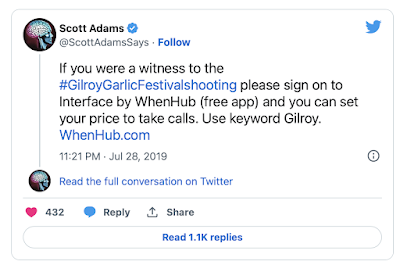From The Washington Post.
The Washington Post, the USA Today network of hundreds of newspapers, the Cleveland Plain Dealer, the Los Angeles Times and other publications announced they would stop publishing “Dilbert” after Adams’s racist rant on YouTube on Wednesday.
Asked on Saturday how many newspapers still carried the strip — a workplace satire he created in 1989 — Adams told The Post: “By Monday, around zero.”
The once widely celebrated cartoonist, who has been entertaining extreme-right ideologies and conspiracy theories for several years, was upset Wednesday by a Rasmussen poll that found a thin majority of Black Americans agreed with the statement “It’s okay to be White.”
The once widely celebrated cartoonist, who has been entertaining extreme-right ideologies and conspiracy theories for several years, was upset Wednesday by a Rasmussen poll that found a thin majority of Black Americans agreed with the statement “It’s okay to be White.”
“If nearly half of all Blacks are not okay with White people … that’s a hate group,” Adams said on his live-streaming YouTube show.
“I don’t want to have anything to do with them. And I would say, based on the current way things are going, the best advice I would give to White people is to get the hell away from Black people … because there is no fixing this.”
Adams, 65, also blamed Black people for not “focusing on education” during the show and said, “I’m also really sick of seeing video after video of Black Americans beating up non-Black citizens.”
Outrage followed.
Adams, 65, also blamed Black people for not “focusing on education” during the show and said, “I’m also really sick of seeing video after video of Black Americans beating up non-Black citizens.”
Outrage followed.
By Thursday, The Post began hearing from readers calling for the strip’s cancellation.
“Scott Adams is a disgrace,” Darrin Bell, creator of “Candorville” and the first Black artist to win the Pulitzer Prize for editorial cartooning, told The Post on Saturday.
“His racism is not even unique among cartoonists.” Bell compared Adams’s views to the Jim Crow era and more recent examples of White supremacy, including “millions of angry people trying to redefine the word ‘racism’ itself.”
He offered a long, quasi-Socratic defense of his comments, which he said were taken out of context, and seemed to define racism as essentially any political activity.
“Any tax code change is racist,” he said at one point in the show. He denounced racism against “individuals” and racist laws, but said, “You should absolutely be racist whenever it’s to your advantage.
Every one of you should be open to making a racist personal career decision.”
In the same show, Adams suggested that he had done irreparable harm to a once-sterling career.
“Most of my income will be gone by next week,” he told about 3,000 live-stream viewers.
In the same show, Adams suggested that he had done irreparable harm to a once-sterling career.
“Most of my income will be gone by next week,” he told about 3,000 live-stream viewers.
“My reputation for the rest of my life is destroyed. You can’t come back from this, am I right? There’s no way you can come back from this.”
Set in a dystopian office where the titular character is tormented by a stupid boss and a talking dog, “Dilbert” appeared in more than 2,000 newspapers at its peak, winning Adams the National Cartoonists Society’s Reuben Award in 1998 and spawning a television show that aired on UPN from 1999 to 2000.
The National Cartoonists Society declined to comment. Andrews McMeel Syndication, the company that syndicates “Dilbert,” did not immediately respond to a request for comment.
The shift in Adams’s public image was initially intertwined with his praise for Donald Trump in the 2016 presidential election.
The National Cartoonists Society declined to comment. Andrews McMeel Syndication, the company that syndicates “Dilbert,” did not immediately respond to a request for comment.
The shift in Adams’s public image was initially intertwined with his praise for Donald Trump in the 2016 presidential election.
Since then, he has identified himself with increasingly extremist viewpoints.
In 2019, he apologized to the victims of a mass shooting at the Gilroy Garlic Festival in California for a tweet in which he used the tragedy to advertise an app he created.
In 2019, he apologized to the victims of a mass shooting at the Gilroy Garlic Festival in California for a tweet in which he used the tragedy to advertise an app he created.
Adams also claimed in June 2020 that the “Dilbert” television show was canceled because he’s White, adding that it “was the third job I lost for being White.”
He tweeted in January 2022 that he planned to “self-identify as a Black woman.”
He has suggested Americans were brainwashed into supporting Ukraine, and praised anti-vaccine advocates last month.
Last May, Adams used “Dilbert” to mock workplace diversity and transgender politics through a new character called Dave the Black Engineer.
“Dilbert” was dropped last year by Lee Enterprises, a media company that runs 77 newspapers in the United States, though that decision appeared to be part of a larger overhaul.
Last May, Adams used “Dilbert” to mock workplace diversity and transgender politics through a new character called Dave the Black Engineer.
The Times Union reported that it and the San Francisco Chronicle stopped publishing “Dilbert” in recent months, after strips that joked about reparations for slavery and inclusive workplaces.
“His strip went from being hilarious to being hurtful and mean,” Emilio Garcia-Ruiz, editor in chief of the Chronicle and a former managing editor at The Post, told the Times Union.
“His strip went from being hilarious to being hurtful and mean,” Emilio Garcia-Ruiz, editor in chief of the Chronicle and a former managing editor at The Post, told the Times Union.
“Very few readers noticed when we killed it, and we only had a handful of complaints."
“Dilbert” nevertheless continued to run in many major publications — at least until this week.
Asked to comment in more detail about his remarks and the mass cancellations, Adams initially declined.
“Dilbert” nevertheless continued to run in many major publications — at least until this week.
Asked to comment in more detail about his remarks and the mass cancellations, Adams initially declined.
He later told The Post in a text message: “Lots of people are angry, but I haven’t seen any disagreement yet, at least not from anyone who saw the context.
Some questioned the poll data. That’s fair.




No comments:
Post a Comment